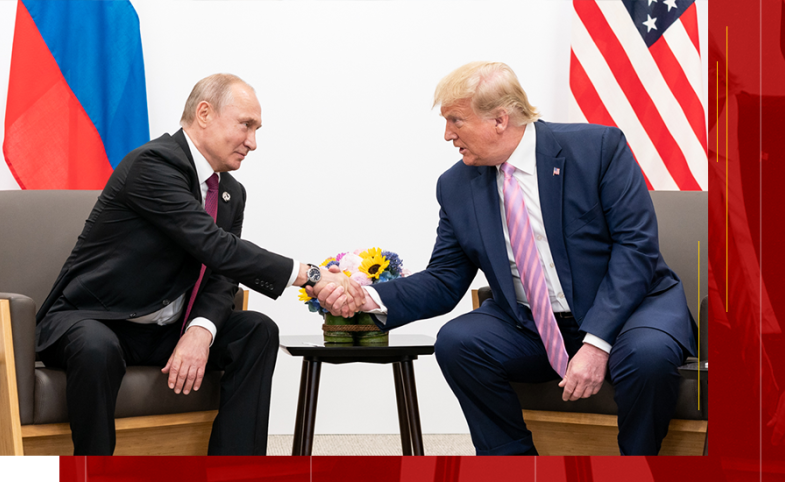“Public Diplomacy in the News” is a CPD Blog series by Andrew Dubbins that spotlights noteworthy stories on public diplomacy topics such as cultural diplomacy, nation branding, exchange programs, international...
KEEP READINGThe CPD Blog is intended to stimulate dialog among scholars and practitioners from around the world in the public diplomacy sphere. The opinions represented here are the authors' own and do not necessarily reflect CPD's views. For blogger guidelines, click here.

Public Diplomacy in the News: Trump's Foreign Policy Overhaul, Pakistan-India Climate Crisis, & Data Center Diplomacy
“Public Diplomacy in the News” is a CPD Blog series by Andrew Dubbins that spotlights noteworthy stories on public diplomacy topics such as cultural diplomacy, nation branding, exchange programs, international events and conferences, digital diplomacy, and strategic global communications.
Trump’s return signals shift toward authoritarian-friendly U.S. diplomacy. Donald Trump’s re-election is expected to shift U.S. diplomacy toward aligning with authoritarian and populist leaders worldwide, potentially weakening alliances with traditional democratic partners. Leaders like Hungary’s Viktor Orbán and Argentina’s Javier Milei have expressed enthusiasm, seeing Trump’s victory as an endorsement of their own nationalist agendas and anti-elite rhetoric. Trump’s warm relationships with figures such as Russia’s Vladimir Putin and Turkey’s Recep Tayyip Erdogan, as well as his criticisms of NATO, signal a foreign policy realignment that may prioritize transactional and nationalist interests over human rights and democratic values, raising concerns among analysts and foreign diplomats alike.
Justin Spike / Associated Press
Trump’s victory sparks plan for sweeping foreign policy overhaul and government purge. Donald Trump’s re-election has sparked plans for a major overhaul in U.S. foreign policy and government operations, with a particular focus on dismantling many of President Joe Biden's policies. Trump aims to “drain the swamp” by firing thousands of government workers and stripping civil service protections, especially in agencies he views as obstacles, like those involved in immigration and human rights. His administration’s approach may prioritize cuts to refugee programs, reassign funds, and freeze international commitments until re-evaluation. With Biden in his final months, his administration is working to solidify aid to Ukraine and stabilize Middle Eastern diplomacy. The world, especially Europe and Ukraine, watches anxiously as Trump’s return threatens significant policy shifts.
Pakistan urges cross-border climate efforts as smog crisis deepens. Eastern Pakistan’s Punjab province has called for “climate diplomacy” with India as hazardous smog envelops cities across both countries, threatening millions’ health. Lahore, a city near the Indian border, recorded unprecedented pollution levels, with officials attributing some blame to windborne pollutants from India but emphasizing shared environmental responsibilities. Each winter, air quality worsens due to agricultural burning, coal plants, and other pollutants. Amid worsening conditions, Punjab’s government is urging collaboration with India, highlighting that pollution ignores borders and impacts citizens on both sides. Both nations have attempted to limit crop-burning practices, though enforcement challenges persist.
Lex Harvey and Sophia Saifi / CNN
Data center diplomacy drives U.S. and Middle East alliances in global AI race. Goldman Sachs Institute's Jared Cohen emphasizes the growing importance of "data center diplomacy" as nations compete in the rapidly evolving AI landscape. With data centers critical for AI infrastructure, Cohen notes that the U.S. will need to partner globally to expand its capacity and manage potential "bottlenecks" in data center growth, as major tech firms invest approximately $600 billion in infrastructure. As countries like China bolster their AI initiatives, a strategic choice emerges between U.S.-aligned and China-aligned investments. The Middle East, particularly wealthy Gulf states like Qatar, Saudi Arabia, and UAE, is positioned as a promising region for AI data centers due to its significant capital, youthful leadership, and ambition to play a leading role in AI innovation.
China balances food security and trade diplomacy amid rising imports. China’s rising food demands have led to an increase in agricultural imports, highlighting the country’s need to balance food security with trade diplomacy. During the China International Import Expo, attended by the Chinese Premier and various heads of state, Chinese leaders pushed to strengthen food security through diverse imports while also navigating complex political and economic relationships with global suppliers. Despite domestic efforts to improve agricultural efficiency, imports remain essential due to cost advantages and consumer preferences for diverse, high-quality products. However, heavy reliance on imports has pressured local farmers, prompting calls for policies to protect domestic markets and develop export-oriented processing zones to mitigate economic impacts. “Trade exchanges are sometimes not just economic activities, they also carry political and diplomatic significance,” Lin Shen of the Chinese Academy of Social Sciences told the South China Morning Post.
Visit CPD's Online Library
Explore CPD's vast online database featuring the latest books, articles, speeches and information on international organizations dedicated to public diplomacy.
POPULAR ARTICLES
-
January 29
-
January 20
-
January 28
-
February 6
-
January 8
Join the Conversation
Interested in contributing to the CPD Blog? We welcome your posts. Read our guidelines and find out how you can submit blogs and photo essays >.













